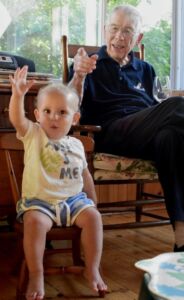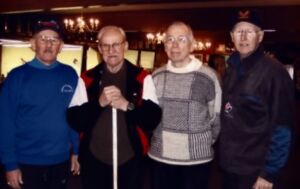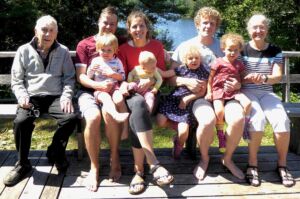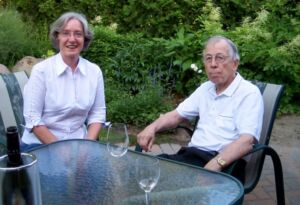Dave Johnston’s long acquaintance with WM and the WMFC
David R. Johnston – Life with Waldenstrom’s Macroglobulinemia

In May 1998 David attributed his unexplained weight loss to the considerable physical effort he put in over several weeks cleaning up fallen branches on the grounds of his beloved family cottage which, along with huge swaths of Eastern Ontario and Western Quebec, had been hit by a catastrophic ice storm a few months earlier.
However, around the same time, David’s GP observed that his haemoglobin had dropped below normal levels to 122, and proceeded to look for a possible cause. Unable to find anything specific, in 2000 the GP referred him to a hematologist, who quickly determined that David had an extra protein in his blood, but that it was of unknown significance. The doctor was trying to tell him that he had MGUS. Further testing in 2002 confirmed that he had an IgM abnormality. When the hematologist moved away, David was without specialist care until he was finally referred to a new hematologist in 2004, who told him for the first time that his IgM abnormality was in fact Waldenstrom’s Macroglobulinemia (WM).
At that time, David, then aged 73, was still fully engaged in a second career as a life insurance actuary, having retired from his position as Senior Vice President and Actuary of a major Canadian life insurance company a number of years earlier. At every opportunity he and his wife, Kirsten, traveled to visit her family in Denmark and explore many other parts of Europe, with Tuscany being a favourite destination. Combined with family time at the cottage every summer and curling in a senior’s league all winter, it made for a busy, active life.
By 2005 his IgM approached 40, and treatment was becoming necessary. The hematologist, who was unfamiliar with any specific WM treatment, prescribed an out-of-date chemotherapy treatment with Clorambucil and a low-dose steroid, both taken in pill form daily for 18 months. While this brought his IgM down to 11, in retrospect the treatment should have been stopped at 12 months.
During this time David discovered a WM support group in Oakville, a suburb of Toronto, where he lives. The group was organized and run by Arlene Hinchcliffe in tribute to her father, who had succumbed to WM, and it quickly became an important source of help and information for him. One member in particular, Betty McPhee, encouraged him to transfer to a more expert hematologist. At her urging, he arranged for his GP to get him transferred to a hematologist at Sunnybrook Hospital in 2007, where he remains under care. This community of fellow WM’ers continues to be an ongoing source of support and information for David to this day. He has reciprocated by applying his own considerable knowledge of WM and its various treatment protocols to help newly diagnosed members, in particular, to understand their condition better and to reassure them that life does go on after diagnosis.
His remission following this first round  of treatment continued for almost 4 years, but in 2010 his IgM again approached 40. By that time Rituximab and chemo had become the standard of care. Because Chlorambucil had worked well before, it was chosen as the companion chemo for the first 6 months of treatment, followed by 24 months of maintenance Rituximab, all of which David tolerated quite well. This treatment was extremely effective and brought his WM into remission until late 2021.
of treatment continued for almost 4 years, but in 2010 his IgM again approached 40. By that time Rituximab and chemo had become the standard of care. Because Chlorambucil had worked well before, it was chosen as the companion chemo for the first 6 months of treatment, followed by 24 months of maintenance Rituximab, all of which David tolerated quite well. This treatment was extremely effective and brought his WM into remission until late 2021.
In December of that year, David commenced treatment with Zanubrutinib with mixed results. Although the IgM has been knocked right down, he has experienced concerning side effects, and the dosage has been reduced a couple of times in an attempt to maintain the therapeutic benefit while minimizing the side effects. He is not yet sure that this drug is right for him.
David’s involvement in the management of the Oakville support group began in 2010, when he volunteered to become a trustee (known then as a statutory member). In 2006, at age 75, he had finally retired from his second career, and had more time to devote to volunteer activities. When a director resigned from the Board in 2011 due to ill health, David stepped in to take his place. He was soon appointed Secretary of the Board, and in 2013 he took on the additional role of Treasurer, and held both positions until 2020. Since then he has continued as a regular member of the Board but will be leaving this position at the time of the Annual Meeting in May 2023, right around his 92nd birthday.
by Kirsten Johnston, Dave’s wife.

An open letter from the founder of the WMFC, Arlene Hinchcliffe, to Dave
Dear David,
As a volunteer WMFC board member for over 13 years you were a most valuable contributor to the success of the WMFC. You have held several positions over the years, most notable as treasurer and secretary and I personally thank you for the support and guidance you gave myself and the other board members. Without volunteers like you the WMFC could not have become what it is today.
You showed so much compassion and gave guidance to newly diagnosed patients. You were always there for them to answer any questions and to share your experiences living with WM. I know you helped all of them to navigate the services offered by both the WMFC and IWMF and eased their fears along the way.
On behalf of all of us we thank you so much for your dedication over the years and wish you the very best.
Sincerely,
Arlene Hinchcliffe
Saying thanks to Dave – some words from the WMFC Board
Cam Fraser: I have had the pleasure of working with Dave for four of his twelve years on the WMFC Board. He is a profound and thoughtful person who can always be relied upon to provide us with a well reasoned opinion on most issues from accounting and legal to general Board direction. He has the ability to bring clarity to the most complicated issues and can recall the entire history of the Foundation. As a highly respected member of our team, his participation in our discussions will be greatly missed and I wish him all the best and continued good health in his future endeavours. The good news is that he is only a phone call away.
Andrew Beacom: Dave has been both an inspiration and an incredible source of knowledge as he transitioned accountability for the WMFC Treasurer role to me. Dave is definitely one of a kind and will be missed by all!
Betty McPhee: It is very difficult to find enough words to describe Dave’s contribution to the WMFC board over the past 13 years. He is sharp and knowledgeable and has great research skills with a kind of memory that most humans don’t possess. He can find past resolutions, ancient bylaws and CRA rules and regs that no one else can. Dave is wise, kind, compassionate and thoughtful. He brings wisdom to our decision making and helps us navigate differing opinions.
He encourages WMers to enjoy life while living with WM by example. And who knows anyone else in their 90’s who curls and lawn bowls? We are so appreciative and grateful to have had Dave on our board. Dave is not the kind of guy that can be replaced. He has given us so much and we love him. Thank you, Dave!
